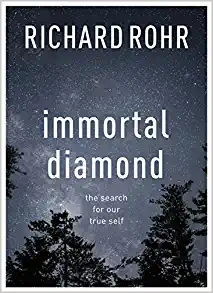I am excited about beginning our discussion of Richard Rohr’s book: Immortal Diamond: The Search for Our True Self. Tonight, we will be discussing the Invitation, Preface, and Chapter 1. This book, like other books written in the mystical or contemplative tradition going back to the very earliest of Christian writings, is always a challenge for me. I like to know and to understand using concrete terminology based upon empirical evidence or at least empirical rational thought. My preference is to keep God and spirituality within the confines of the rational thought of medieval scholastics such as Anslem of Canterbury or Reformation-era thinkers like Martin Luther or John Calvin or our own XXXIV Articles. It’s why I relish Bible studies because we take words and create an image of God and a coherent theology.
Ultimately, however, Christianity is not about theological concepts but about the Divine Reality to which these theological concepts point and for which these theological become wholly inadequate. In his Life of Moses, St. Gregory of Nyssa (who was the spiritual leader of the Council of Constantinople in 381 that wrote our present version of the Nicene Creed) reminds me that we should not mistake our understandings of Divine Reality for the Divine Reality itself. He writes that “every concept formed by the intellect in an attempt to comprehend and circumscribe the divine nature can succeed only in fashioning an idol, not making God known. . . . Concepts create idols; only wonder comprehends anything. People kill one another over idols. Wonder makes us fall to our knees.” This is ultimately the tradition in which Rohr writes which makes this book difficult for me.
Looking at chapter 1 (and in borrowing this outline from the Episcopal Diocese of Arizona) there are several important points that Rohr brings out:
- Rohr stresses the importance of understanding the work of the two halves of our life. In the first half, we establish the “container,” the structure, and the rules we use to function safely in life. Then in the second half, we receive the “contents,” that which we need to wrestle with the Big Questions of life—the soul, life, death, and the Divine. Discovering the True Self is the work of the second half of life. p.9, fn. p.216. We see this working out in the Creation story of Genesis 1 where God forms the structure of creation in Days 1-3 (light, sky, sea, dry land) and fills these structures on Days 4-6 (heavenly bodies, birds, fish, animals).
- The discovery of our True Self is found in our discovery of the Kingdom of Heaven as described by Jesus. pp.12-14. This discovery is like a treasure hidden in a field, which a man found and covered up; then in his joy, he goes and sells all that he has and buys that field. Matt. 13:44. Or it is like a merchant in search of fine pearls, who, on finding one pearl of great value, went and sold all that he had and bought it. Matt 13:45-46. The “Immortal Diamond” of the true self is this treasure or pearl of which Jesus speaks.
- Our True Self is our “soul” or “psyche.” Rohr uses the image of a butterfly to describe our soul. “It alights, tastes, and moves forward…your soul is who you are in God and who God is in you.” It is the very image of God. pp.15-17. And like a butterfly, if you pin it down to study it, it dies and loses its animation.
- God is the “Great Allower.” When both God and the True Self fully reveal themselves in freedom, then the major work of discovering the True Self and living into the Kingdom is in full process. p.19. God refrains from dictating our life and our journey to us.
- “Soulful people, invariably humble and honest about themselves, are also risk takers: they both know the rules and how to break the rules properly.” p.20. This is always the issue in Paul’s proclamation of the Gospel: “’All things are lawful for me,’ but not all things are helpful. ‘All things are lawful for me,’ but I will not be enslaved by anything.’” 1 Cor. 6:20. This is how Paul understands Christian freedom, that we are not bound by rules but only in humility and love can we move past them. See, Gal. 5:2-15.
- Most importantly, Rohr says we do not create our True Self, earn it, or work up to it; we simply have to access the very breath of God. p.25. Rohr points out that the name of God – Yah-weh – is formed by inhaling and exhaling. It is that breath that God breathed into the nostrils of his creation making Adam a living being. Gen. 2:7. We are not saved by creating, earning, or working, but by simply having the faith to recognize and see what was there all along.
Dinner is at 6. The menu is Cobb Salad. Discussion about 6:45. (Billy will lead us in meditation to begin.) Compline at 8. Hope to see you here. Please bring a friend. If you need a book, please let me know.
For now we see in a mirror, dimly, but then we will see face to face. Now I know only in part; then I will know fully, even as I have been fully known.
1 Cor. 13:12

